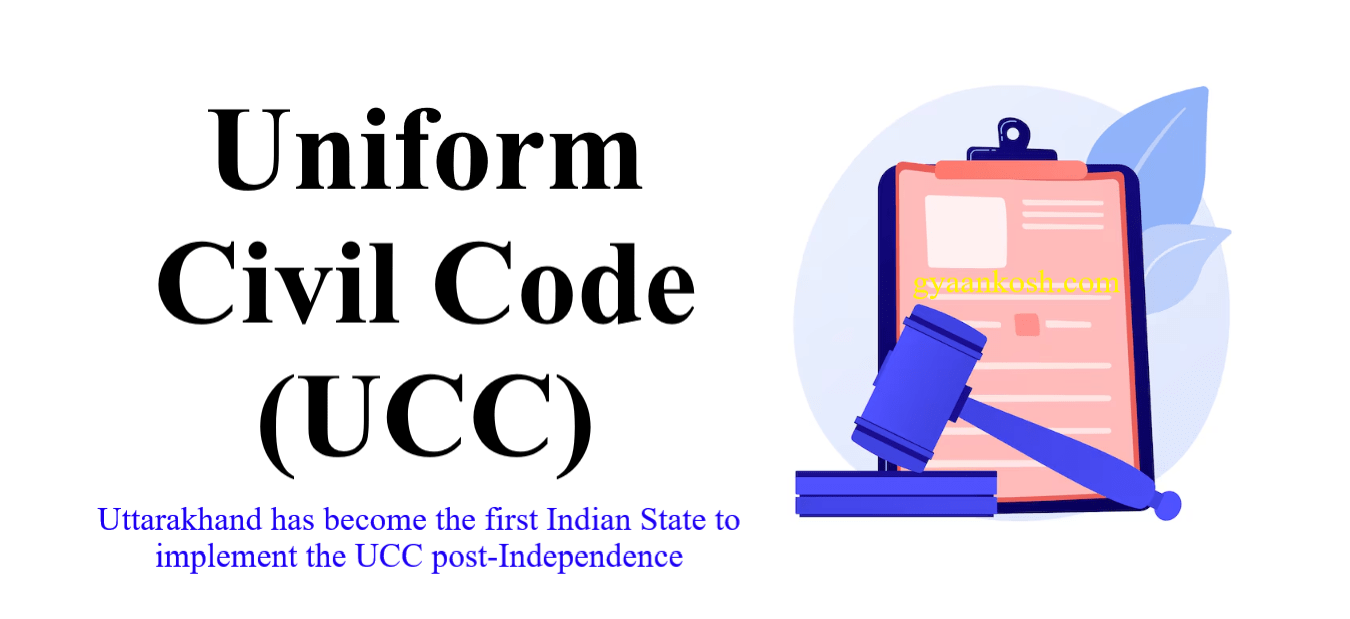Contents
Recently, Uttarakhand Chief Minister Pushkar Singh Dhami on 27th January 2025 officially rolled out the Uniform Civil Code (UCC) for all residents of the State, except the Scheduled Tribes and natives who have migrated out of the State. With this, Uttarakhand has become the first Indian State to implement the UCC post-Independence.
About Uniform Civil Code (UCC)
Uniform Civil Code (UCC) is a proposed law in India to establish a common set of laws that would govern personal matters such as marriage, divorce, inheritance, and adoption for all citizens, regardless of their religion, caste, or community.
The main idea behind this code is to replace the existing system, where personal laws vary based on religious practices (e.g., Hindu law, Muslim law, Christian law).
The main goal is to promote equality and national integration. The main aim of this code is to establish a single set of civil laws that apply to all citizens, irrespective of their religion or community. But it has been a contentious issue, with supporters arguing for uniformity and critics raising concerns about religious freedom and cultural diversity.
This concept is envisioned in Article 44 of the Indian Constitution, which states that “The State shall endeavour to secure for the citizens a uniform civil code throughout the territory of India.”
Historical Context
Colonial Era
Personal laws were first framed during the British Raj, mainly for Hindu and Muslim subjects. The British feared opposition from community leaders and refrained from further interfering within this domestic sphere. The Indian state of Goa was separated from British India during the colonial rule in the erstwhile Portuguese Goa and Daman, retained a common family law known as the Goa civil code and thus was the only state in India with a uniform civil code prior to 2024.
British let the Indian public have the benefit of self-government in their own domestic matters with the Queen’s 1859 Proclamation promising absolute non-interference in religious matters. The personal laws involved inheritance, succession, marriage and religious ceremonies. The public sphere was governed by the British and Anglo-Indian law in terms of crime, land relations, laws of contract and evidence—all this applied equally to every citizen irrespective of religion.
Under British colonial rule, the legal system in India was based on a mix of colonial law and personal laws of various communities. The British used a pluralistic system where different communities were governed by their own religious laws in personal matters like marriage, divorce, inheritance, and adoption. For example:
- Hindus were governed by Hindu law (based on scriptures like the Manusmriti).
- Muslims followed Sharia law in personal matters.
- Christians and Jews had separate provisions under British laws.
While this system was initially designed to maintain peace and order by respecting local customs, it also entrenched legal pluralism, where different groups had different rights and obligations. This, in turn, made the idea of a unified legal code seem distant.
Post-independence
Following India’s independence, Hindu code bills were introduced which largely codified and reformed personal laws in various sects among Indian religions like Buddhists, Hindus, Jains and Sikhs but they exempted Christians, Jews, Muslims and Parsis.
After the independence in 1947, the idea of a UCC was strongly debated. Many believed that it would be a step toward creating a more unified and modern society, moving away from the colonial-era practice of religiously separate personal laws.
After India’s independence in 1947, the framers of the Indian Constitution were tasked with creating a legal system that was fair, modern, and secular. One of the key objectives was to unify the country under a single set of laws that would promote national integration and ensure equality for all citizens, regardless of their religion.
- Dr. B.R. Ambedkar and other leaders like Jawaharlal Nehru envisioned a modern, secular India where the state would not favor any religion. This idea led to the inclusion of Article 44 in the Directive Principles of State Policy, which recommended the gradual establishment of a Uniform Civil Code across the nation. However, this was framed as an aspirational goal, with the understanding that it would take time to implement.
- While the Constitution of India declared India a secular republic, the personal laws of different communities were kept intact, mostly due to the influence of religious leaders and the desire to avoid alienating various communities.

Judicial Views on UCC
Over time, the Indian judiciary has raised concerns about the need for a UCC to ensure equality and justice for all citizens. Some landmark Supreme Court cases reflect this:
In Shah Bano case (1985), the Supreme Court ruled in favor of a Muslim woman who sought alimony after a divorce under the Muslim Women (Protection of Rights on Divorce) Act, 1986. The ruling was seen as an attempt to move toward equality for women, and it stirred a national debate on the necessity of a UCC. Many Muslim leaders opposed the ruling, arguing that it interfered with their personal law, leading to the passage of the Muslim Women’s (Protection of Rights on Divorce) Act, which reversed the Supreme Court’s decision.
In the Sarala Mudgal case (1995), the Supreme Court again raised concerns about the lack of a uniform civil code, highlighting how personal laws of different communities led to discrepancies and inequality.
But the Critics argue that a UCC could infringe upon religious freedoms, as different communities (especially Hindus, Muslims, and Christians) have their own established personal laws. Some fear it could erode the cultural and religious diversity that India is known for.
Features of UCC
- Ban on Practices – UCC Bill bans practices such as halala, iddat, and talaq (customs related to marriage and divorce in Muslim Personal Law).
- Equal Rights – It also ensures that women are given equal rights in matters related to property and inheritance.
- Gender Justice – UCC ensures gender justice by addressing gender-based discrimination in existing personal laws such as, in some religious laws (like Hindu or Muslim laws), women may face disadvantages in matters like inheritance or divorce and here, UCC would work to eliminate such discrimination and ensure equal rights for both men and women.
- Secularity – UCC would be secular which means it would not be based on religious doctrines but on principles of justice, equality, and human rights. It would modernize personal laws to reflect current social values and individual freedoms.
- Uniform Marriage and Divorce Laws – Under a UCC, the rules for marriage and divorce would be the same for everyone. Currently, different religious groups have different legal standards and practices.
- Hindus may have rules around dowry or bigamy that differ from those followed by Muslims, Christians, or Parsis.
- The UCC would standardize provisions such as the minimum age of marriage, consent, and grounds for divorce.
- The monogamy principle, which restricts individuals to a single spouse, would be upheld across all communities, as opposed to some systems that allow polygamy (like some interpretations of Muslim law).
- Child Protection – UCC would aim to protect children from practices like child marriage, which is still prevalent in some communities under certain personal laws. It would standardize the age of marriage and ensure the protection of children’s rights. The rights of children born out of marriage (whether legitimate or illegitimate) would be governed by the same laws across all communities.
Implementation
Uttarakhand Chief Minister Pushkar Singh Dhami officially rolled out the Uniform Civil Code (UCC) for all residents of the State, except the Scheduled Tribes and natives who have migrated out of the State. With this, Uttarakhand has become the first Indian State to implement the UCC post-Independence.
UCC mandates online registration of marriages, divorce and live-in relationships. A government portal — ucc.uk.gov.in — has been formed for the purpose. People can access records, register complaints and also upload their will on the portal. Mr. Dhami also registered his marriage on the portal.
According to a communique from the State government, the online portal created for the UCC registration has Aadhaar-based verification. An AI-based translation service will translate the content into 22 languages, including English. The portal has integrated data from across more than 13 government departments, including civic bodies, police and courts.
Sources
- News
- Wikipedia



Leave a Reply
You must be logged in to post a comment.